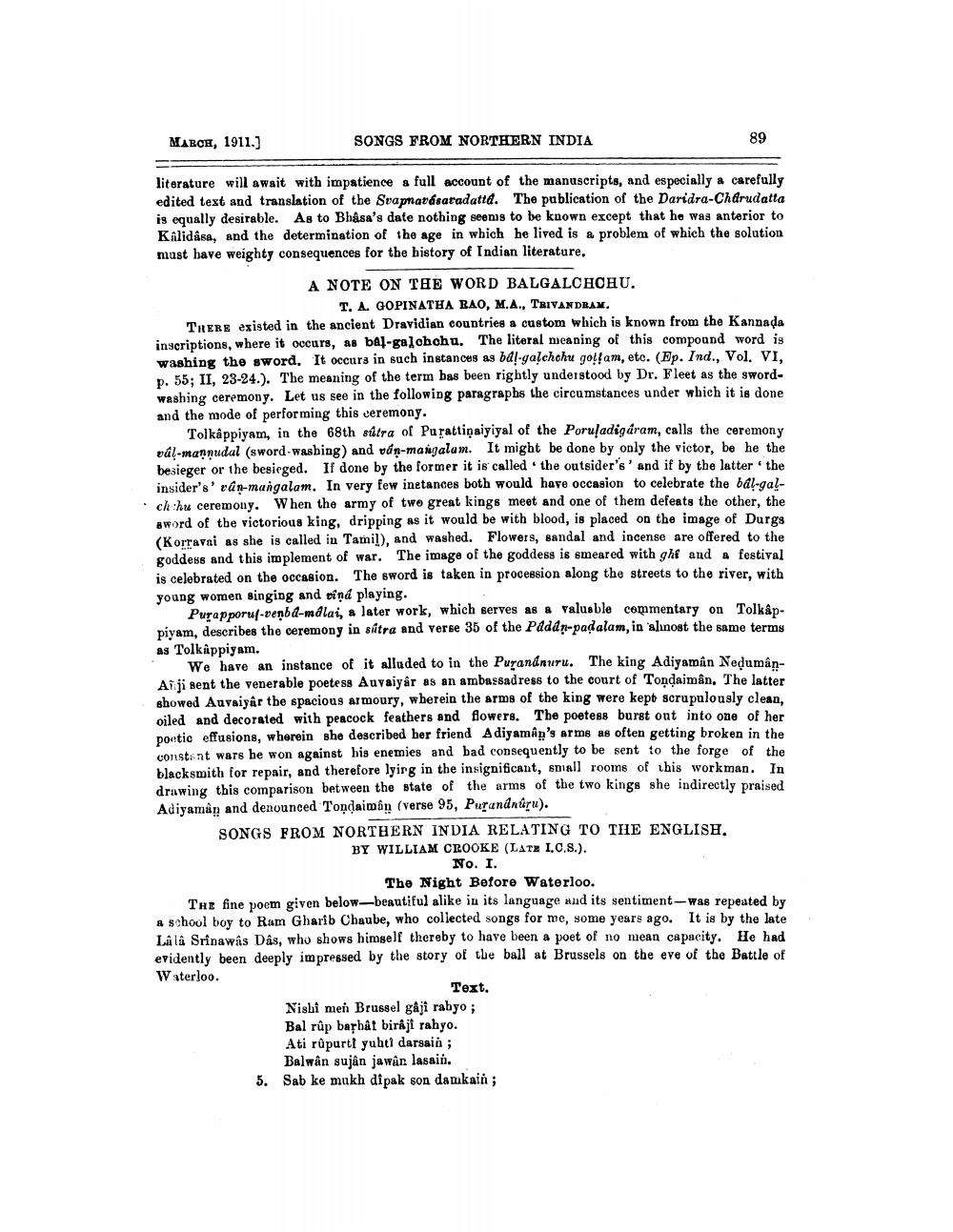________________
MARCH, 1911.)
SONGS FROM NORTHERN INDIA
89
literature will await with impatience a full account of the manuscripts, and especially a carefully edited text and translation of the Svapnavasaradatta. The publication of the Daridra-Charudatta is equally desirable. As to Bhâsa's date nothing seems to be known except that he was anterior to Kalidasa, and the determination of the age in which he lived is a problem of which the solution must have weighty consequences for the history of Indian literature.
A NOTE ON THE WORD BALGALCHOHU.
T. A. GOPINATHA RAO, M.A., TRIVANDRAX. THERE existed in the ancient Dravidian countries a custom which is known from the Kannada inscriptions, where it occurs, as bal-galchchu. The literal meaning of this compound word is washing the sword. It occurs in such instances as ba!-galchchu go!!am, etc. (Bp. Ind., Vol. VI, p. 55; II, 23-24.). The meaning of the term bas been rightly understood by Dr. Fleet as the swordwashing ceremony. Let us see in the following paragraphs the circumstances under which it is done and the mode of performing this ceremony.
Tolkappiyam, in the 68th sútra of Purattiņaiyiyal of the Poru!adigáram, calls the ceremony vál-mannudal (sword-wasbing) and rán-mangalam. It might be done by only the victor, be he the bezieger or the besieged. If done by the former it is called the outsider's' and if by the latter the insider's' van-mangalam. In very few instances both would have occasion to celebrate the bal-galchchu ceremony. When the army of two great kings meet and one of them defeats the other, the sword of the victorious king, dripping as it would be with blood, is placed on the image of Durgs (Korravai as she is called in Tamil), and washed. Flowers, sandal and incense are offered to the goddess and this implement of war. The image of the goddess is smeared with ghi and festival is celebrated on the occasion. The sword is taken in procession along the streets to the river, with young women singing and vind playing.
Purapporul-venba-malai, a later work, which serves as a valuable commentary on Tolkanpiyam, describes the ceremony in sítra and verse 35 of the Paddn-padalam, in 'ahnost the same terms as Tolkappiyam.
We have an instance of it alluded to in the Purandnuru. The king Adiyaman NedumânAnji sent the venerable poetess Auvaiyâr as an ambassadress to the court of Tondajmân, The latter showed Auvaiyar the spacious armoury, wherein the arms of the king were kept scrupulously clean, oiled and decorated with peacock feathers and flowers. The poetess burst ont into one of her poetic effusions, wherein she described her friend Adiyaman's arms as often getting broken in the constant wars he won against his enemies and bad consequently to be sent to the forge of the blacksmith for repair, and therefore lying in the insignificant, small rooms of this workman. In drawing this comparison between the state of the arms of the two kings she indirectly praised Adiyaman and denounced Tondaimon (verse 95, Purandnúru). SONGS FROM NORTHERN INDIA RELATING TO THE ENGLISH.
BY WILLIAM CROOKE (LATR I.C.S.).
No. I.
The Night Before Waterloo. Tu fine voom given below-beautiful alike in its language and its sentiment-Was repeated by A school boy to Ram Gharib Chaube, who collected songs for me, some years ago. It is by the late Lali Srinawas Das, who shows himself thereby to have been a poet of no mean capacity. He had evidently been deeply impressed by the story of the ball at Brussels on the eve of the Battle of Waterloo.
Text. Nisbi men Brussel gaji rahyo; Bal rûp başbât biraji rahyo. Ati rûpurti yubti darsain ;
Balwan sujan jawan lasain. 5. Sab ke mukh dipak son damkain ;




